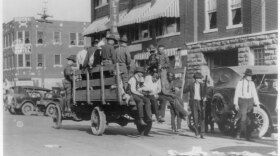-
Legislation to designate the site of the Tulsa Race Massacre of 1921 as a national monument breezed through the Senate last month, but its path through the House is less certain.
-
The 1921 Tulsa race riots began after a Black man was accused of assaulting a white woman. The case was later dismissed in court, but historians estimate that up to 300 people died during the riots.
-
The program, based on a New York Times project, is a pilot. Organizers hope more like it can be arranged elsewhere in the country.
-
“It’s a very sad story,” said Rhonda Bennett of Cherokee history. “Fighting among each other is just a sadder story.”
-
Attorneys representing the two remaining survivors of the 1921 Tulsa Race Massacre filed a final brief in their reparations case with the Oklahoma Supreme Court on Monday and await the high court's decision on whether to let their trial proceed.
-
Researchers announced a "geophysical anomaly" had been detected during a test excavation this summer. Now, they're digging deeper.
-
J. Kavin Ross, who passed away in May, spent many years researching the history of the massacre and the burial sites of victims.
-
Survivors of the 1921 Tulsa Race Massacre are hoping the Oklahoma Supreme Court will hear their case.
-
"An eye-opening history of nine African American women in medicine.... This immersive tribute to a group of pioneering women will inspire readers of all backgrounds." -- Publishers Weekly
-
"Riveting history.... Excellently rendered." -- Kirkus Reviews (starred review)

Play Live Radio
Next Up:
0:00
0:00
Available On Air Stations










